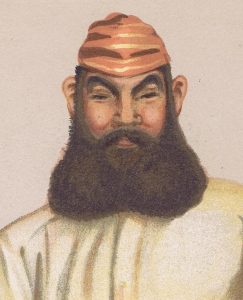Description
Original Vanity Fair Lithograph Print of: W.G Grace. Mr. William Gilbert Grace, Published: 9th June 1877. With the caption at the bottom of the print: Cricket. Dimensions approximately 26cm x 38cm. Free postage.

W.G Grace
William Gilbert “W. G.” Grace, MRCS, LRCP (18 July 1848 – 23 October 1915) was an English amateur cricketer who was important in the development of the sport and is widely considered one of its greatest-ever players. Universally known as “W. G.”, he played first-class cricket for a record-equalling 44 seasons, from 1865 to 1908, during which he captained England, Gloucestershire, the Gentlemen, Marylebone Cricket Club (MCC), the United South of England Eleven (USEE) and several other teams.
Right-handed as both batsman and bowler, Grace dominated the sport during his career. His technical innovations and enormous influence left a lasting legacy. An outstanding all-rounder, he excelled at all the essential skills of batting, bowling and fielding, but it is for his batting that he is most renowned. He is held to have invented modern batsmanship. Usually opening the innings, he was particularly admired for his mastery of all strokes, and his level of expertise was said by contemporary reviewers to be unique. He generally captained the teams he played for at all levels because of his skill and tactical acumen.
Grace came from a cricketing family: E. M. Grace was one of his elder brothers and Fred Grace his younger brother. In 1880, they were members of the same England team, the first time three brothers played together in Test cricket. Grace took part in other sports also: he was a champion 440-yard hurdler as a young man and played football for the Wanderers. In later life, he developed enthusiasm for golf, lawn bowls and curling.
He qualified as a medical practitioner in 1879. Because of his medical profession, he was nominally an amateur cricketer but he is said to have made more money from his cricketing activities than any professional cricketer. He was an extremely competitive player and, although he was one of the most famous men in England, he was also one of the most controversial on account of his gamesmanship and moneymaking. (wikipedia)
Signed by: SPY., SPY is pseudonym of the resident artist Sir Leslie Matthew Ward.
Library image.

















